Toshiba Satellite T130-11H – 13.3in Laptop Review
Toshiba Satellite T130-11H – 13.3in Laptop
An Intel CULV CPU gives the Toshiba Satellite T130-11H over seven hours of battery life.
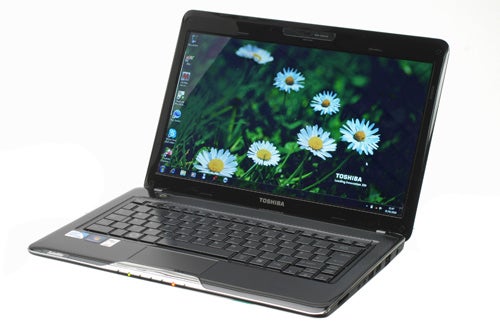
Verdict
Key Specifications
- Review Price: £443.47
Toshiba has a bit of a pedigree when it comes to ultra-portable computing, the Portege R600 being the perfect example of its ability to shave weight off and produce an impossibly light machine. Bearing this in mind, it ought to have the expertise to produce a very good affordable ultra-portable. The Satellite T130-11H, currently retailing for just shy of £450, is one of its first attempts.
It’s a 13.3in machine that’s adorned in the now all too familiar glossy black plastic. Indeed, anyone with a passing knowledge of Toshiba’s laptop range will instantly recognise the T130, since it shares so many of its common design themes: glossy finishes, imprinted patterns and a sprinkling of faux-chrome. It’s a passably attractive, if rather high maintenance, effect and one that’s also available in white and a rather fetching red should you prefer.
Being an ultra-portable, the T130 is also very thin and light, weighing in at just 1.76kg and measuring as little as 22.2mm at its slimmest point. This increases to 34.2mm at the rear where the battery extends downward, but it does little to detract from the otherwise svelte look and feel.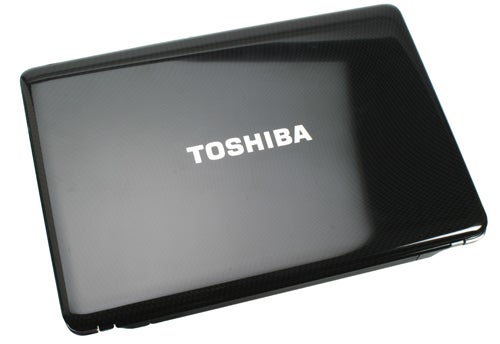
Glancing at the spec sheet, however, does highlight some causes for concern. While we’ve been quite happy with the performance of Intel’s dual-core CULV processors, we’re less convinced of the value of the single-core variety like the Pentium SU2700 powering the T130. It ticks along at a sedate 1.3GHz which, without the help of another identical core, doesn’t leave a lot of headroom – especially considering Intel’s integrated graphics won’t pull up trees, either.
This is backed by a reasonable 3GB of RAM and a 250GB hard drive, while Wireless-N Wi-Fi and Bluetooth are both available for wireless networking duties. You only get 10/100 Fast Ethernet mind, but the Wi-Fi is more than fast enough for most needs. Most encouraging for those after long battery life – which, after all, is kind of the point of a machine like this – is the presence of a high capacity, 61 Watt-hour battery.

Connectivity is also a plus point. Among the HDMI, VGA and three USB ports is a ‘sleep & charge’ USB (on the left) that allows you to charge mobile devices even while the laptop is turned off. This is a common feature on Toshiba laptops and a very useful one, too. Other connections include headphone and microphone jacks, and a 5-in-1 memory card reader.
Opening up the T130 reveals a keyboard clad in a similar black finish to the rest of the machine, albeit with a semi-matt finish that’s not quite so prone to fingerprints and greasy smudges. On the whole it’s a good keyboard; we have no qualms with the layout and the keys themselves are large enough for comfortable typing. Initially you might find the key actions a little imprecise, if only because they lack that satisfying ‘snap’ of a really good keyboard, but it’s nothing you won’t become accustomed to over time.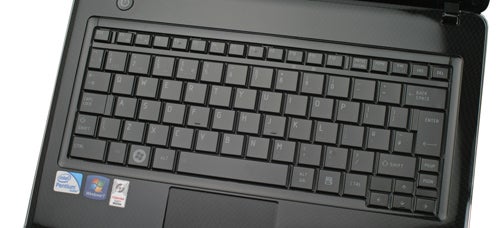
Below it, the touchpad is a fairly typical textured affair that features the now ubiquitous multi-touch support. It’s a good size, but the two rocker-style buttons do feel a tad imprecise and the touchpad itself was occasionally quite laggy – an irritating trait for any laptop.
One doesn’t typically expect great things from laptop displays, not unless you’re spending over £1,000 at least. As middle-of-the-road laptop screens go, however, the one on the T130 is better than most. Colours are punchy, text is sharp and readable and it’s bright enough to be viewed in brightly lit locations. Provided your demands are no more taxing than watching videos and the occasional bit of photo editing, it’ll do nicely. It’s just a shame, as is so often the case, that the glossy finish to the display is so reflective that direct sunlight is a real problem.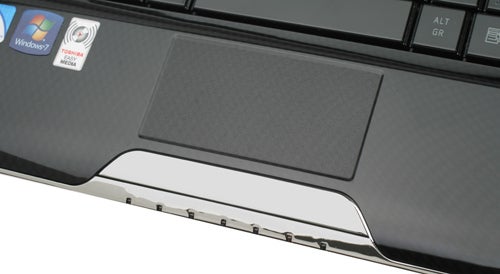
You can forget about using the integrated speakers, though. Lack of bass aside they produce reasonable clarity, but they’re so quiet that they’re rendered more or less useless. Even online video, whose content hardly demands great audio treats, are barely watchable due to the pitiful volume. It’s a surprise given Toshiba is normally so strong in this respect.
One thing Toshiba can always be relied upon, however, is to install way too much software on their laptops. Not all of it can be fairly termed ‘bloatware’ and Windows 7’s tidier taskbar does at least mean you’re not irritated by the endless stream of icons, but we still feel Toshiba could be a little more selective in its choices – do we really need a webcam utility popping out from the side of the screen constantly?
As hinted at earlier, one area where the T130 really struggles is in performance. Despite being on sale at similar prices to the likes of the Acer Aspire Timeline 1810TZ, it comes with a sluggish single-core processor that’s absolutely annihilated in our PCMark Vantage testing, trailing the Acer by 40 per cent and the AMD-powered HP Pavilion dm3-1020ea by 35 per cent. Admittedly the latter is around £100 more than the Toshiba, but a portion of that cost can be attributed to the HP’s external optical drive.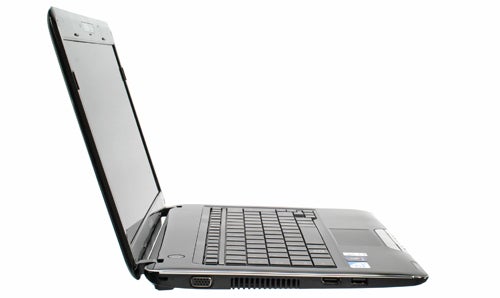
These results were reflected in our subjective experience of performance. While the T130 is faster than a netbook, it still has the slight sluggishness and unresponsive feel of such devices. Likewise, it struggles with some high-definition content, too. 720p video runs fine and 1080p does too, albeit hogging most of the CPU cycles, but you can forget about any HD flash video. Ultimately, given there are excellent alternatives available at a similar price, there’s little reason to put up with performance as disappointing as this. As such, assuming you’re interested in the T130 as a whole, you’re better off looking at one of the other models in the range, some of which offer a dual-core processor instead.
Its one saving grace is battery life. Again the T130 doesn’t quite reach the heights of the Acer Aspire 1810TZ, but seven hours and 20 minutes of productivity is a mighty result by anyone’s standards. This is also the one area where it holds an advantage over the similar sized HP Pavilion dm3, whose battery life stops short of five hours.
Unfortunately, though impressive, this battery life isn’t enough to rescue the Toshiba T130-11H. Its performance just isn’t up to spec given the alternatives on offer. It is, however, based on a sound chassis, so the more expensive dual-core versions should offer far more palatable performance and be greatly improved as a result. Toshiba has promised to send us one of these soon, so keep any eye-out for a follow-up review.
Verdict
While the chassis, keyboard and general feature set of the T130-11H are just fine, it’s let down by a lackadaisical single-core processor that doesn’t offer anything close to acceptable performance. Provided you can afford a bit more, we’d seriously recommend opting for one of the more expensive dual-core models.
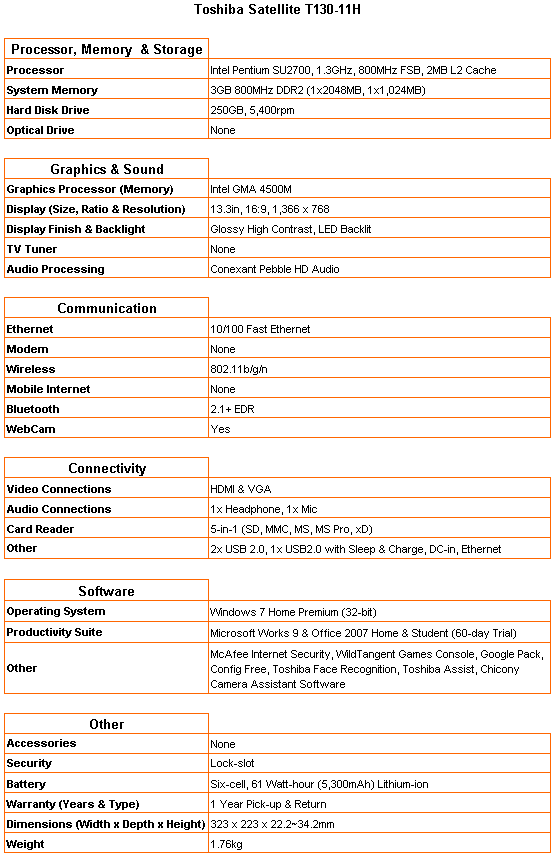
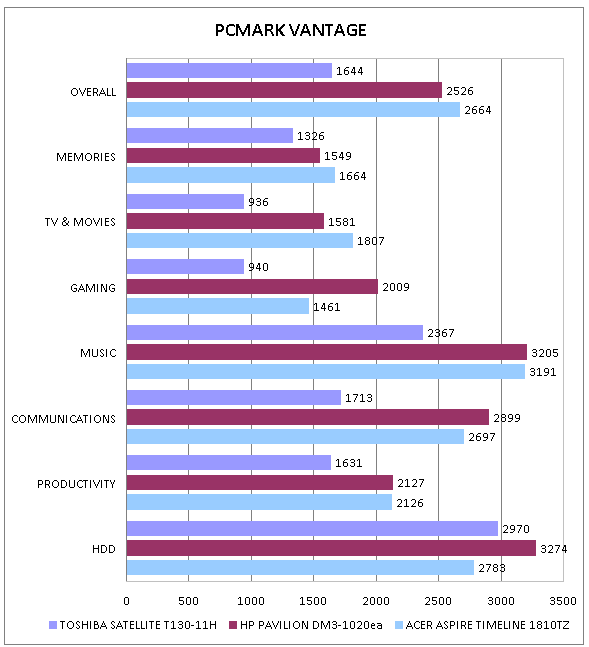
Here we can see the Toshiba’s single-core processor struggling to match two dual-core equipped laptops. Deficits of 35 and 40 per cent are far too large for comfort.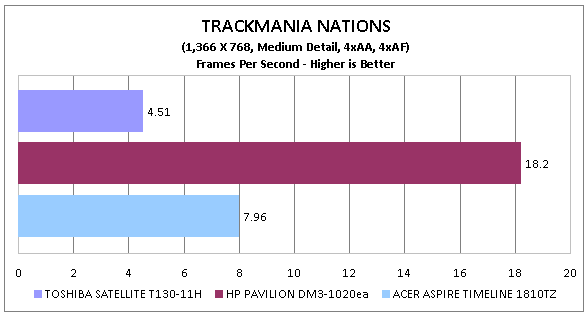
Less than 5fps in our Trackmania Nations tests shows this is no gaming machine.
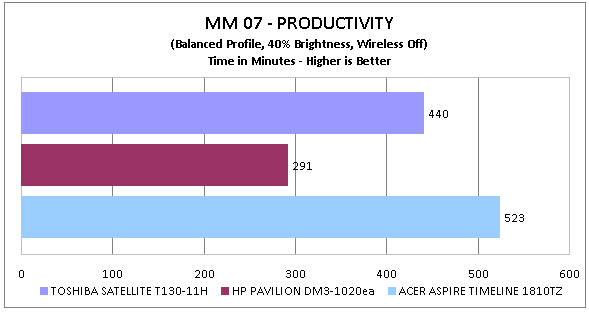
One redeeming aspect of the T130’s performance is its battery life. While not quite as impressive as the Acer, seven hours and 20 minutes is still excellent and beats the HP quite comfortably.
How we test laptops
Unlike other sites, we test every laptop we review thoroughly over an extended period of time. We use industry standard tests to compare features properly. We’ll always tell you what we find. We never, ever, accept money to review a product.
Trusted Score
Score in detail
-
Performance 4
-
Design 7
-
Value 5
-
Features 6
-
Battery Life 9

